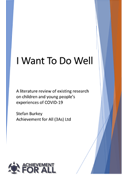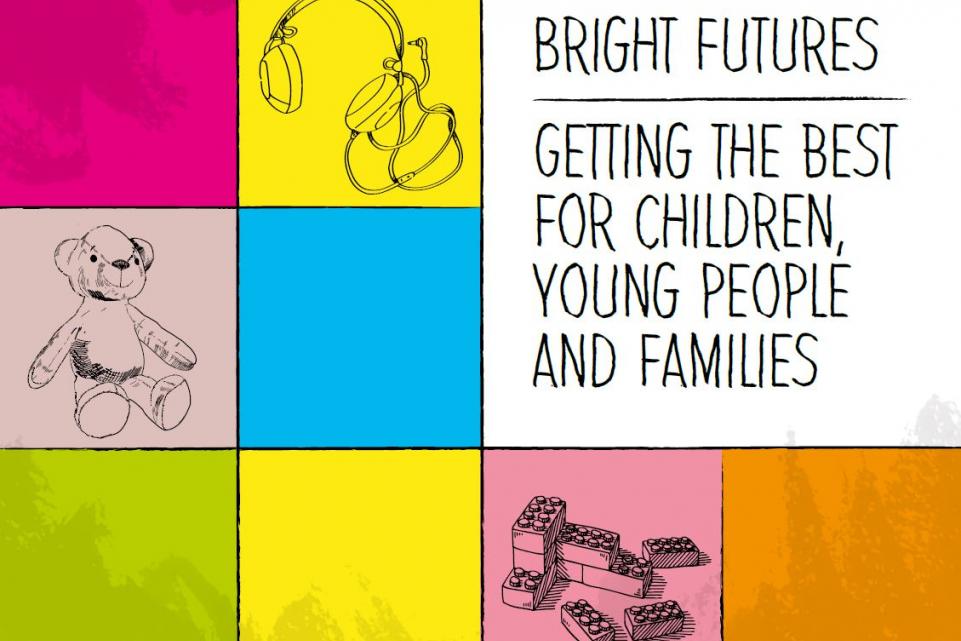Resetting the relationship between local and national government. Read our Local Government White Paper
We need to put children and young people at the heart of our plans to rebuild our communities and create a better future.
Creating those opportunities and brighter futures will need Government investment to support the increased demand for local council services for families and children as we rebuild our road to recovery.
The COVID-19 pandemic has had an immeasurable impact on all of us, and councils have been at the forefront of local responses since day one. As we move into the next phase of the pandemic, thoughts are turning towards recovery and what that will look like given the significant uncertainties still facing us.
The main challenges for children’s services are yet to come. As children return to school, and as the full, long-term impact of the pandemic becomes apparent, councils anticipate a sharp increase in demand for everything from universal support services through to urgent child protection responses. Councils will also be working closely with schools to support children as they return, and to coordinate wider education system responses such as changes to home-to-school transport.
Councils and the Government will need to work swiftly to deal with the immediate challenges to children, young people and their families if we are to avoid long-term damage to their prospects. In particular, supporting families through the next stages of the pandemic, our recovery and the potential long shadow of lockdown impacts will be key to helping our communities to get back on their feet.
We now need councils and the Government to put children’s needs at the heart of recovery.
Increased demand for children’s services
Despite this phenomenal effort, the main challenges for children’s services are yet to come. We don’t yet know the full impact of the pandemic on children, young people and their families, but councils across the country are expecting a significant increase in demand for services as we move through the coming months.
Rising demand for services means that despite budgets for children’s social care rising by more than half a billion pounds in 2018/19, more than eight in ten councils were still forced to overspend to ensure children were protected.
The Government must properly fund councils to deliver the effective, holistic and responsive services needed to put children and young people at the heart of recovery.
Helping families and children early on
Providing support early on to families and children helps to prevent longer term problems but to do this councils need Government funding so they can invest in preventative universal and early help services.
We need to make sure mental health support is available, for both children and adults, that local safety nets are properly resourced and well organised to avoid families falling into crisis.
of children’s services budgets were spent on preventative services in 2017/18, a reduction from 41 per cent in 2010/11. During this period there had been a corresponding rise in spend on child protection services, most notably for looked after children.
Our ask of Government
We want to see funding for early help services for children restored to former levels, boosting funding by £1.7 billion. Over the last decade the Early Intervention Grant has fallen by almost two thirds from £2.8 billion in 2010/11 to £1.1 billion in 2018/19.
Getting learning back on track
Schools are also going to be under significant pressure as they work to put children’s mental wellbeing at the forefront while helping children to get their learning back on track. They are likely to face challenges ensuring young people return to school, settling children back into routines, supporting children through pandemic-related anxieties, managing behaviour and re-establishing the relationships that enable children to flourish.
Children and young people will have had very different experiences of education when most schools closed in March. Some will have worked with online tutors, or worked through excellent online lessons with the help of their teachers using video calls. Others will have struggled without internet access, or in homes where parents were juggling full time jobs with home education.
increase in the learning attainment gap between children and young people from disadvantaged backgrounds and their peers since the pandemic.
The Government must work with schools and councils to take dedicated action to prevent the attainment gap between disadvantaged children and young people and their peers from widening by supporting school attendance or home learning where required.
Young people not in employment, education or training
Young people who are currently in education or approaching the juncture to move into further or higher education have found their studies paused or partially continuing online. This means that many will not have had access to face-to-face careers advice and support to progress to further or higher education, training or employment. With young people more likely to experience difficulties in finding employment as the country recovers from the pandemic, supporting them will be key to their future prospects.
The Apprenticeship Levy funding should be paused to avoid any funds expiring during and shortly after the crisis period, particularly where they were earmarked for activity that has since been delayed due to COVID-19 and would not therefore have expired otherwise.
Children’s experience of the pandemic
As part of its work to support councils and the Government to deliver a child-centred recovery from the pandemic, the Local Government Association commissioned Achievement for All to carry out a literature review of evidence about children and young people’s experiences of the pandemic.
The review is the first part of our work to support councils and government to understand the views of children and young people so that they can incorporate these into their planning and decision-making. Due to the timings of the report, the review focuses largely on experiences of lockdown. We anticipate carrying out further research as time goes on to capture changing views and longer-term impacts, as well as to better understand the varied experiences of different groups of children and young people.
Children’s Homes: Barriers and Facilitators to Councils and Small Providers Developing Provision
Councils are reporting increasing difficulties in finding suitable children’s home places for the children and young people in their care, especially for children who have more complex or challenging needs. At the same time, councils have been raising concerns about the growth of the largest independent providers of children’s homes, with issues around profit-making, financial risk and the ability to ensure the right homes for children all being identified.
This report was commissioned to look at the barriers to councils and smaller providers developing children’s homes, alongside what might facilitate this to ensure a varied market that responds to what children need and makes sure they have the homes they deserve. It also proposes a series of recommendations, which the Local Government Association will consider as part of its ongoing work to support councils to ensure that children in care have homes in which they are safe and happy, and where they can fulfil their potential.











